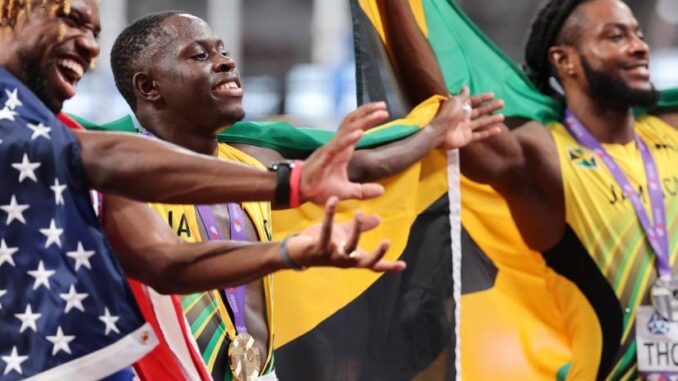
Track legend Usain Bolt has never been one to shy away from speaking his mind, and he proved that once again following the men’s 100 metres final at the 2025 World Athletics Championships in Tokyo. The eight-time Olympic gold medallist took aim at both American sprint star Noah Lyles and Jamaica’s newly crowned champion Oblique Seville, delivering a brutally honest assessment that has left the athletics community buzzing.
Bolt, who was present at the National Stadium to watch the final, made headlines when he suggested that Seville’s performance — though worthy of gold — still lacked the “killer instinct” that he believes defines true sprinting dominance. “Oblique ran a great race, but there were moments in the last 20 metres where he should have shut it down harder,” Bolt said in a post-race interview. “When you’re at the top, you don’t just win — you send a message. Tonight he won, but he didn’t scare anybody.”
The comment comes despite Seville’s personal-best performance of 9.77 seconds, a time that places him among the top sprinters in history. Bolt’s remarks are being interpreted by many as both a challenge and a form of tough love for his Jamaican compatriot. As one of the men responsible for putting Jamaica on the global sprinting map, Bolt has always been protective of the country’s sprinting legacy, and his high expectations for the next generation are well known.
But it wasn’t only Seville who felt the sting of Bolt’s words. Noah Lyles, who had positioned himself as the man to beat coming into Tokyo, finishing a disappointing fourth in the final, also came under fire. Bolt dismissed Lyles’ pre-race confidence, reminding the American that fast talk needs to be backed by even faster times. “Noah is a great athlete and a great entertainer,” Bolt admitted. “But sprinting is about execution, not headlines. If you’re going to talk about being the fastest man alive, you better deliver when it counts.”
Lyles has been known for his bold proclamations and outspoken presence on social media, often drawing comparisons to Bolt’s own charismatic personality during his career. However, Bolt’s critique suggests that he sees a clear difference between showmanship and substance. His comments have sparked debates among fans, with some arguing that Bolt was unnecessarily harsh, while others believe his honesty could motivate Lyles and Seville to elevate their performances in future races.
Bolt’s words carry weight because of his status as the most decorated sprinter in history. His 9.58 world record still stands unchallenged, and his championship performances remain the gold standard. By publicly challenging Seville and Lyles, Bolt may be attempting to push them toward the sort of rivalry and brilliance that defined his era.
Whether his comments inspire or irritate, one thing is clear — Bolt remains deeply invested in the sport and in the legacy of the 100 metres. If Seville and Lyles take his critique as fuel, athletics fans could be in for an even more electrifying showdown at next year’s Olympic Games in Paris.
Be the first to comment